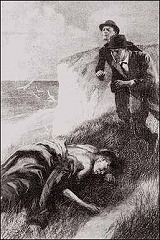At this moment we saw the man himself. His head showed above the edge of the cliff where the path ends. Then his whole figure appeared at the top, staggering like a drunken man. The next instant he threw up his hands and, with a terrible cry, fell upon his face. Stackhurst and I rushed forward - it may have been fifty yards - and turned him on his back. He was obviously dying. Those glazed sunken eyes and dreadful livid cheeks could mean nothing else. One glimmer of life came into his face for an instant, and he uttered two or three words with an eager air of warning. They were slurred and indistinct, but to my ear the last of them, which burst in a shriek from his lips, were “the Lion’s Mane.” It was utterly irrelevant and unintelligible, and yet I could twist the sound into no other sense. Then he half raised himself from the ground, threw his arms into the air, and fell forward on his side. He was dead.

My companion was paralyzed by the sudden horror of it, but I, as may well be imagined, had every sense on the alert. And I had need, for it was speedily evident that we were in the presence of an extraordinary case. The man was dressed only in his Burberry overcoat, his trousers, and an unlaced pair of canvas shoes. As he fell over, his Burberry, which had been simply thrown round his shoulders, slipped off, exposing his trunk. We stared at it in amazement. His back was covered with dark red lines as though he had been terribly flogged by a thin wire scourge. The instrument with which this punishment had been inflicted was clearly flexible, for the long, angry weals curved round his shoulders and ribs. There was blood dripping down his chin, for he had bitten through his lower lip in the paroxysm of his agony. His drawn and distorted face told how terrible that agony had been.
I was kneeling and Stackhurst standing by the body when a shadow fell across us, and we found that Ian Murdoch was by our side. Murdoch was the mathematical coach at the establishment, a tall, dark, thin man, so taciturn and aloof that none can be said to have been his friend. He seemed to live in some high, abstract region of surds and conic sections, with little to connect him with ordinary life. He was looked upon as an oddity by the students, and would have been their butt, but there was some strange outlandish blood in the man, which showed itself not only in his coal-black eyes and swarthy face but also in occasional outbreaks of temper, which could only be described as ferocious. On one occasion, being plagued by a little dog belonging to McPherson, he had caught the creature up and hurled it through the plate-glass window, an action for which Stackhurst would certainly have given him his dismissal had he not been a very valuable teacher. Such was the strange complex man who now appeared beside us. He seemed to be honestly shocked at the sight before him, though the incident of the dog may show that there was no great sympathy between the dead man and himself.
“Poor fellow! Poor fellow! What can I do? How can I help?”
“Were you with him? Can you tell us what has happened?”
“No, no, I was late this morning. I was not on the beach at all. I have come straight from The Gables. What can I do?”
“You can hurry to the police-station at Fulworth. Report the matter at once.”